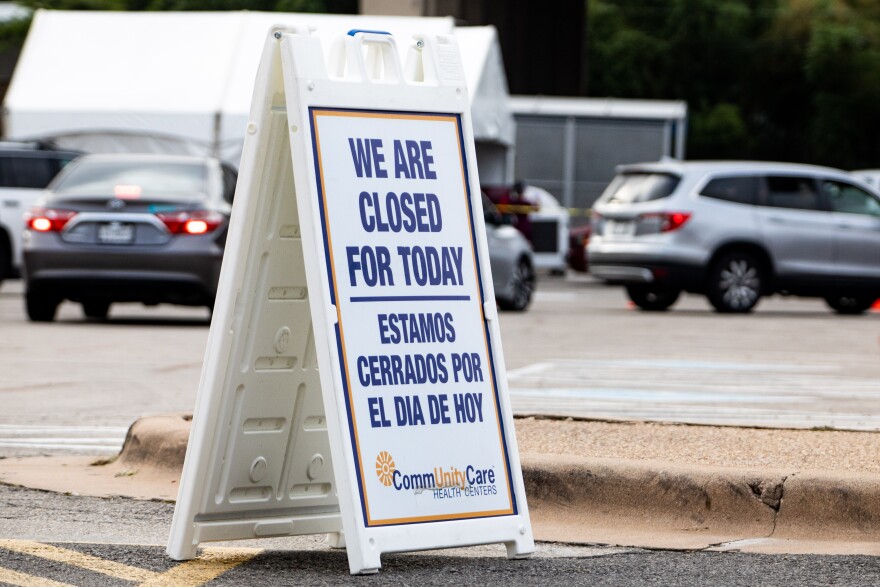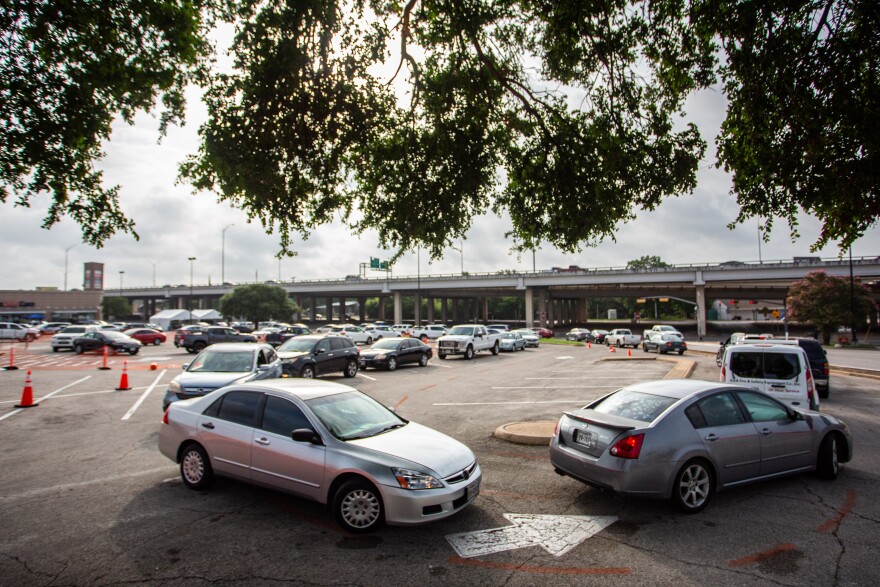It was a little after 8 a.m. on Monday when Austin resident Emma VanDelinder arrived at a CommUnityCare COVID-19 testing site. But when she drove up, she saw a handwritten sign and realized she was out of luck. Testing was over.
She rolled down her window to talk to a health care worker, who told her the site had reached its capacity for the day. The location on William Cannon opened at 6:30 a.m., but people had started lining up much earlier. (One person had been waiting since 4:30 a.m., the worker said.)
“I looked around like, ‘What am I supposed to do? Where should I go?’ and she shrugged her shoulders and said, ‘I don’t really know,’” VanDelinder said.
Both public and private COVID-19 testing providers in the Austin area are reporting an increase in demand for testing. That can mean longer wait times — both to get a test and to get the results back. And now some testing sites are prioritizing tests for those who need them most.
MAP: Drive-Thru COVID-19 Testing Locations In Austin And How To Access Them
CommUnityCare, the network of health centers funded by Travis County’s health care district, is one of the few test providers that doesn’t require people to schedule an appointment. The network has set up drive-thru and walk-up testing locations in various parts of the county, offering free tests to people without health insurance.

Monica Saavedra, director of marketing and community relations, said demand for tests has at least tripled at all CommUnityCare locations in the last few weeks. While the health centers don’t have a shortage of tests right now, she said locations can only test so many people each day due to staff size and the limits of a location.
“Most of our locations were set up to test 30 to 40 people a day, and we’re getting 400 people showing up, so the parking lots aren’t the size that we would want,” Saavedra said. “The demand is so much more than we anticipated and what we had in the beginning.”
The health centers had been testing anyone who requested a test, but on Thursday announced they can no longer do that and will only be testing people with symptoms, a known exposure to the virus or underlying health conditions. Saavedra said testing is “first come, first served” and staff is telling people who call the CommUnityCare hotline to arrive before the location opens if they want to get tested. (That tip is also written in bold letters on its website.)
Austin Regional Clinic says it has also seen a threefold increase in people requesting tests — and in the number of tests coming back positive — in the last two weeks. Dr. Manish Naik, ARC’s chief medical information officer, says the increase in demand correlates with the recent relaxation of social-distancing guidelines and people starting to be less vigilant about wearing masks and washing hands.
Delayed Results
ARC conducts testing via drive-thru and in person at its primary care clinics in Central Texas. The clinics offer viral tests, which tell you if you are currently infected, and antibody tests, which might tell you if you had an infection in the past. Naik says ARC also has a “very limited” supply of rapid-testing kits, which are used when “the doctor deems it medically necessary to obtain results within 24 hours.”
Naik says ARC is confident it’ll have an adequate supply of tests and personal protective equipment going forward, but the increase in demand has led to longer wait times for test results to come in. Testing sites send their tests to state or commercial labs that determine if they’re positive or negative.

“The local labs have been overwhelmed with the demand and we have seen test results come back in 7-10 days rather than the 3-5 days we had been seeing previously,” Naik said in an email.
An extended turnaround time for test results impacts the ability to reinforce safe behaviors, says Dr. Amy Young, chief clinical officer for UT Health Austin. The clinic offers appointment-based drive-thru testing to people with symptoms or who have been in contact with someone who tested positive.
Young said people who think they have symptoms or were in contact with someone who tested positive should isolate themselves from others, both before they can get a test and while they’re waiting for test results.
“I think having a positive test result reinforces that behavior, and unfortunately when that turnaround time is delayed, at no fault of anybody except that it’s a supply-and-demand issue, the ability to reinforce that behavior is not quite as good,” she said.
UT Health Austin has seen an increase in demand for testing, too. While previously the staff did around 60 tests per day, now they’re doing 90 or just over 100 a day, Young said.
“People are coming to us because they couldn’t get tested in a timely fashion at some other sites,” she said.
Obstacles To Contact Tracing
UT Health Austin’s testing facility is also connected to a contact-tracing team. Contact tracing is the process of identifying people who have come in contact with someone with a contagious disease, such as COVID-19, so they can be told to quarantine to prevent further spread. But the process doesn’t start until a test result comes back positive. Delays to get a test due to increased demand combined with a delay in lab results impedes contact tracers' ability to intervene in a timely manner.
Austin Public Health warned Tuesday that people should not rely on contact tracing to contain the spread. With the surge in cases and a delay in lab processing, it’s become more difficult for APH’s contact tracers to inform people who've been around a positive case in time to stop any spread.
“Contact tracing in this time of uncontrolled widespread transmission is not going to be as effective, especially if people continue to have increased contact with others outside of their household,” Dr. Mark Escott, interim health authority for Austin-Travis County, said a press release.
APH says people waiting for test results should self-isolate immediately, even from family members, to help prevent any potential spread of the disease. People who can’t self-isolate in their own home or those who live with a high-risk person or essential worker can stay at a hotel that Austin and Travis County are using as an isolation facility.
Shifting Priorities
APH’s free public testing is also overwhelmed right now by an increase in requests for tests. While not long ago, officials were encouraging everyone to get tested whether they had symptoms or not, now APH is prioritizing those with symptoms.
Other testing sites are also looking to make changes in response to the demand. Young said UT Health Austin is starting to consider different thresholds for when testing is valuable and when it’s not. CommUnityCare stopped offering drive-thru testing at two of its smaller locations this week — Pflugerville and William Cannon — and is looking for new locations that can handle a higher volume of people. CommUnityCare patients can still get tested at those two locations, though, if they set up an appointment.
Both APH and CommUnityCare are asking people who have health insurance to seek other options for testing – like pharmacies, urgent care centers and other private testing locations – to free up space for those who don’t have insurance. Saavedra said CommUnityCare’s focus is serving people who are uninsured or lack access to a medical provider.
“If that is you, then we are here for you to serve you,” she said. “If you do have a provider or medical insurance, we want to encourage you to seek testing with your provider or at other places, so we can leave our sites open to the most vulnerable.”
"If you've got symptoms of COVID-19 ... then there's a good chance you have COVID-19. So if you can't get tested, you must behave as if you have a positive test in hand."
APH says people with insurance should not be charged for the standard PCR COVID-19 test, according to the Families First Coronavirus Response Act and the CARES Act, which were both passed by Congress.
But a lack of transparency in cost has some people concerned about private testing sites. Before she tried CommUnityCare on Monday, VanDelinder visited a private testing location. When a health care worker handed her a paper saying the test would be charged as an emergency room visit, she got nervous and left. She’d read a New York Times article about people in Austin who used their insurance and were billed an “outrageous amount” for testing.
“The varying in prices is especially frustrating because nobody is being very overt about what the cost will be aside from those that are free, and those that are free seem to be out of tests within minutes of opening their testing,” VanDelinder said. “So I’m frustrated and feel like we could be doing this better and we’re not.”
APH is working to release a map of testing sites by the end of the week, so people can understand what their options are other than a public testing site. But if demand for tests continues to increase, all the testing sites in the area, public and private, may not be able to test everyone who needs to be tested, Escott told Travis County Commissioners on Tuesday. That means people need to err on the side of caution.
“If you’ve got symptoms of COVID-19 … then there’s a good chance you have COVID-19,” he said. “So if you can’t get tested, you must behave as if you have a positive test in hand. You must stay home, you must isolate yourself from other members of your family.”
Got a tip? Email Marisa Charpentier at mcharpentier@kut.org. Follow her on Twitter @marisacharp.
If you found the reporting above valuable, please consider making a donation to support it. Your gift pays for everything you find on KUT.org. Thanks for donating today.





